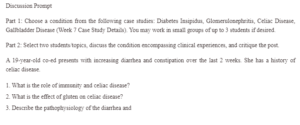Celiac Disease
What is the role of immunity and celiac disease?
Celiac disease is an autoimmune condition that means the body undergoes an abnormal immune response to something the body recognizes as a foreign invader and attacks organs and tissues. The body’s immune system is usually programmed to defend it from foreign invaders. This is why innate immunity is vital in preventing celiac disease development. It is a T-cell-mediated immune disorder, and so it is characterized by a lack of oral gluten tolerance and the authorization of intraepithelial lymphocytes to destroy intestinal epithelial cells, resulting in damage to the villi in the small intestines, which are finger-like projections that play a role in the absorption of nutrients from food (Tye-Din et al.,,2018). Immunity acts by modulation of these lymphocyte function processes and dendritic cells’ action.
What is the effect of gluten on celiac disease?
When celiac disease patients consume gluten-containing foods such as wheat, barley, and rye, their immune systems produce antibodies to gluten, which attack the intestinal lining. This damages the villi and causes inflammation in the small intestines (Parzanese et al., 2017). The villi are usually responsible for the absorption of nutrients from food. If the villi are impaired, the individual will be unable to absorb nutrients properly and will become malnourished, regardless of how much food they consume.
Describe the pathophysiology of the diarrhea and constipation.
Celiac disease causes diarrhea due to nutritional maldigestion and malabsorption; constipation is caused by the intestinal bacterial flora feasting on undigested and unabsorbed food materials, which causes gas to be released. The gas can be excessive or even explosive. This results from an abnormal immune system reaction to gluten ingestion, causing villi atrophy and preventing the absorption of nutrients from the food. This provides food for bacterial flora to feed on; hence, constipation and, due to malabsorption of nutrients, diarrhea is initiated.
References
Kahaly, G. J., Frommer, L., & Schuppan, D. (2018). Celiac disease and endocrine autoimmunity–the genetic link. Autoimmunity reviews, 17(12), 1169-1175. https://doi.org/10.3389/fped.2018.00350
Parzanese, I., Qehajaj, D., Patrinicola, F., Aralica, M., Chiriva-Internati, M., Stifter, S., … & Grizzi, F. (2017). Celiac disease: From pathophysiology to treatment. World journal of gastrointestinal pathophysiology, 8(2), 27. https://doi.org/10.1016/j.autrev.2018.05.013
ORDER A PLAGIARISM-FREE PAPER HERE
We’ll write everything from scratch
Question
Discussion Prompt

Celiac Disease
Part 1: Choose a condition from the following case studies: Diabetes Insipidus, Glomerulonephritis, Celiac Disease, Gallbladder Disease (Week 7 Case Study Details). You may work in small groups of up to 3 students if desired.
Part 2: Select two students/topics, discuss the condition encompassing clinical experiences, and critique the post.
A 19-year-old co-ed presents with increasing diarrhea and constipation over the last 2 weeks. She has a history of celiac disease.
- What is the role of immunity and celiac disease?
- What is the effect of gluten on celiac disease?
- Describe the pathophysiology of the diarrhea and

